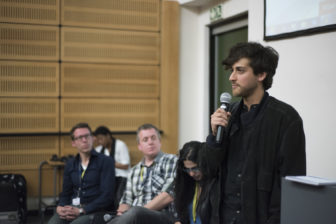 If there is one universal struggle faced by investigative reporters, it’s the challenges presented by working with sources: How do you get a source to trust you? How do you ensure protection for your source? How do you attract the right kind of tip-offs in the first place?
If there is one universal struggle faced by investigative reporters, it’s the challenges presented by working with sources: How do you get a source to trust you? How do you ensure protection for your source? How do you attract the right kind of tip-offs in the first place?
A panel consisting of Bastian Obermayer, the reporter at German newspaper Süddeutsche Zeitung to whom the Panama Papers were leaked, Santiago Carrion, co-founder of the Associated Whistleblowing Press, Marcel Oomens, project manager at Free Press Unlimited, and Khadija Sharife, Africa editor at OCCRP gathered to share their experiences and answer questions, moderated by Brigitte Alfter, managing editor at Journalismfund.eu. Here are five collective pearls of wisdom.
1. How do you vet leaked information?
-
Consider the source’s motivations.
If journalists overlook this step, media can become a playground for politicians seeking one-upmanship or career advancement. Journalists should also guard against being used as a channel for people to avenge themselves or wage personal wars.
Sharife gave the example of someone who had come forward with a significant leak, but has an obvious conflict of interest compromises the information.
-
Cross-check everything several times over, especially if your source is anonymous.
Obermayer said that when he received the Panama Papers: “We knew we couldn’t really trust the source, so we had to trust the documents – and the only way you can do that is through cross-checking.” About 100 other news organizations around the world also helped to cross-check some of the 11.5-million documents, searching for corroboration in court records, company registers, and other official records.
2. What if the information has been confirmed, but the source had ulterior motives in leaking it?
Take an example provided by a #GIJC17 participant from Zimbabwe. With all the uncertainty over the leadership structure in that country with the removal of its long-time president Robert Mugabe, the organization he works for had suddenly started to receive leaked information about corruption in the government. Not coincidentally, those leaking the information were hopeful incumbents in the race for the presidential takeover. Should her news organization publish the information?
“If it’s in the public interest, you have a responsibility to publish it,” said Obermayer. It makes little difference what motivated the leak if the information is legitimate and important for the public to know, he argued.
Sharife suggested that, in a case like this, it becomes crucial to provide context to the reader and disclose the source of the leaks. You would mention that you’d received the information from a member of the opposition who was also privy to the corruption before the race for leadership began.
“The job of the journalist is to investigate the source, who it harms and who it helps. The story, not just the info, is in the public interest,” she said.
3. Are anonymous sources of information a problem?
“People say to me, ‘if the source is anonymous, how do you know it’s not the CIA?’” said Obermayer. “It makes some difference, but it doesn’t really change the way we report on the stories.” The general feeling was that anonymity of sources is not an issue as long as the information can be verified.
Carrion’s advocacy work goes one step further and actually encourages anonymity, in an effort to get members of the public to disclose corruption to journalists. “Even if you’ve known a source for 20 years, you should still be cross-checking information,” he said, underscoring the fact that the journalistic process remains the same regardless of the source.
4. How do we encourage a culture of whistle-blowing?

In some languages there isn’t even a word for whistle-blowing, said Santiago Carrion. Photo: Madelene Cronjé
Carrion pointed out that some languages don’t even have a word for whistle-blowing, and that the concept in some countries is completely foreign. He suggests three tactics to create a more fertile environment
- Provide didactic materials – simple graphs and videos that educate the public about how it can be done.
- Perform targeted campaigns. “Don’t sit back and wait for an amazing source to come forward; you can actually go looking for them,” he said.
- Use your publication as a platform. Prove to the public that the process is working and it’s safe by publishing leaked information, showing that no one was harmed and no sources were revealed.
5. How can we create strong, more collaborative engagements with members of the public?
One way to do this is to create secure, encrypted anonymous tip-off platforms for people to visit. Oomens has overseen the creation of such industry-wide platforms in the Netherlands, Mexico, Nigeria and a fourth that will launch in Indonesia. These sites allow sources to choose the publication that will receive their information, and they are guided through a simple tip-off process, while remaining completely anonymous.
The panelists recommend providing a number of easy ways for a source to contact your organization, such as by physically visiting the offices and dropping off documents, or using a website, email and so forth. “The media must show their support for the whistle-blower,” said Oomens.
Lastly, show empathy for the whistle-blower. At the end of it all, the journalists might win an award for their work, while the whistle-blower might lose his or her job, be socially isolated and, in some cases, battle to find new employment. “People must understand that being a whistle-blower is an incredibly lonely thing,” said Sharife.
The originally published story was updated on Monday to remove a quote which might have compromised a source.
 Thalia Holmes is a South African freelance journalist specializing in business, health and long-form feature writing. She has won various national awards for her work. Previously she worked at the Mail & Guardian as a business reporter, and was a management consultant in a former life before finding her passion in media.
Thalia Holmes is a South African freelance journalist specializing in business, health and long-form feature writing. She has won various national awards for her work. Previously she worked at the Mail & Guardian as a business reporter, and was a management consultant in a former life before finding her passion in media.
 Madelene Cronjé is an independent photographer based in Johannesburg, South Africa. Formerly a staff photographer at the Mail & Guardian, she specializes in photojournalism and editorial portraiture.
Madelene Cronjé is an independent photographer based in Johannesburg, South Africa. Formerly a staff photographer at the Mail & Guardian, she specializes in photojournalism and editorial portraiture.
